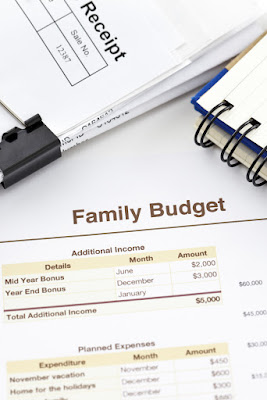1. Start At The Beginning
A very good place to start! Before you can begin successfully budgeting, you have to decide what method works best for you. Would you like to build a spreadsheet that adds and subtracts everything for you? Would you rather cash every paycheck so you can physically see how many dollars you have at your disposal? There's no right or wrong answer; it's simply a matter of finding what works best for you.
2. Don't Be Afraid To Start Over.
There are a million different ways to budget. If you start one but find that you are unable to stick with it, don't feel obligated to stick it out. There is no harm in switching to a new strategy! Keep exploring different options until you find a system that helps simplify your process without causing additional stress.
3. Update Your Budget Periodically
You may have found a system that works for you, but that does not mean that you won't still have to update your budget every once in a while. There are a lot of normal life changes that can require you to update your budget, such as getting a raise (or a pay cut), going back to school, having a baby, and getting married or divorced.
4. Know Your Income
As any working man or woman can tell you, your "before tax" income and your "after tax" income are two very different things. When creating a budget, you have to know how much money you have coming in. Look carefully at your paycheck to see how much is actually deposited into your bank account - don't base your budget on the before-tax numbers!
5. Budget The Necessities First
Some things in your budget will be non-negotiable, such as rent, insurance, and utility bills. Before you can successfully divide up your spending money, you have to know how much money is going towards these fixed expenses. Once you have determined your fixed expenses, budget your other necessities, such as groceries. Save your fun expenses for last!
6. Focus On Your Debt
 Between student loans, credit cards, cars, and mortgages, many of us accumulate a decent amount of debt over the years. If you have debt hanging over the shoulders, make sure to give it some extra attention in your budget. At a bare minimum, you should make sure you always have enough set aside to cover the monthly payments. If you have some wiggle room, you may want to consider putting some extra dollars towards your debt to pay it off faster.
Between student loans, credit cards, cars, and mortgages, many of us accumulate a decent amount of debt over the years. If you have debt hanging over the shoulders, make sure to give it some extra attention in your budget. At a bare minimum, you should make sure you always have enough set aside to cover the monthly payments. If you have some wiggle room, you may want to consider putting some extra dollars towards your debt to pay it off faster.7. Keep Your Receipts
Successful budgeting requires you to be able to track your expenses. By keeping all of your receipts, you will be able to tally up your expenses at the end of the day, week, or month and see exactly where your money went. However, remember that some purchases (such as those at garage sales or farmers' markets) won't come with receipts. You'll need to develop a system for tracking those expenses as well, even if it's something as simple as taking notes in your phone.
8. Minimize Unnecessary Spending
This tip may be easier or more challenging for you, depending your financial habits, but unnecessary spending is the quickest way to ruin a budget. Starbucks may sound like a great idea, but you could probably make a fun coffee drink at home for less than half the price. The latest cell phone model may sound enticing, but do you really need it if your old phone is still working well? Identifying your priorities will allow you to identify what counts as "unnecessary" spending and adjust your spending accordingly.
9. Think About Your Purchases.
This tip goes hand-in-hand with the last one. In order to minimize unnecessary spending (and the associated buyer's remorse) give yourself around twenty-four hours to think about your purchases before you make them. This is especially important for miscellaneous items. If you still want to buy them after twenty-four hours (and if it fits in your budget, of course), you will be able to make your purchase with confidence.
10. Give Yourself Some "Fun Money"
Budgets are kind of like diets; if you keep to a strict regime all the time, one slight slip-up can be completely disheartening. You can set yourself up for success by allowing yourself some room in your budget for the fun purchases, like a trip to the movies, a new pair of shoes, or frozen custard.
First Bank of the Lake is Here to Help!
Some people find that they find it helpful to establish different bank accounts for different purposes. For example, they may set up a savings account to hold the money that will be designated for fixed expenses and a checking account to handle all the miscellaneous expenses. If you would like more information about establishing a savings or a checking account at the Lake of the Ozarks, give us a call!
First Bank of the Lake - Striving For Excellence
Member FDIC. Equal Housing Lender.
Located at the entrance to the Osage Beach Premium Outlets!
4558 Osage Beach Parkway, Suite 100
Osage Beach, MO 65065
(573) 348-2265



No comments:
Post a Comment